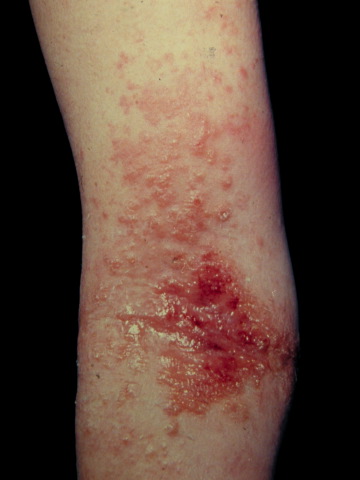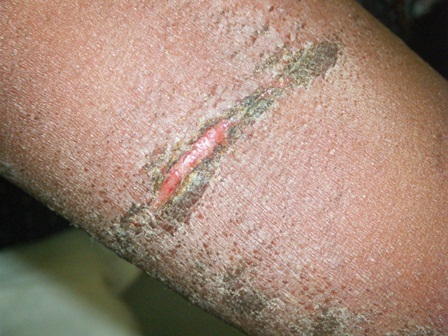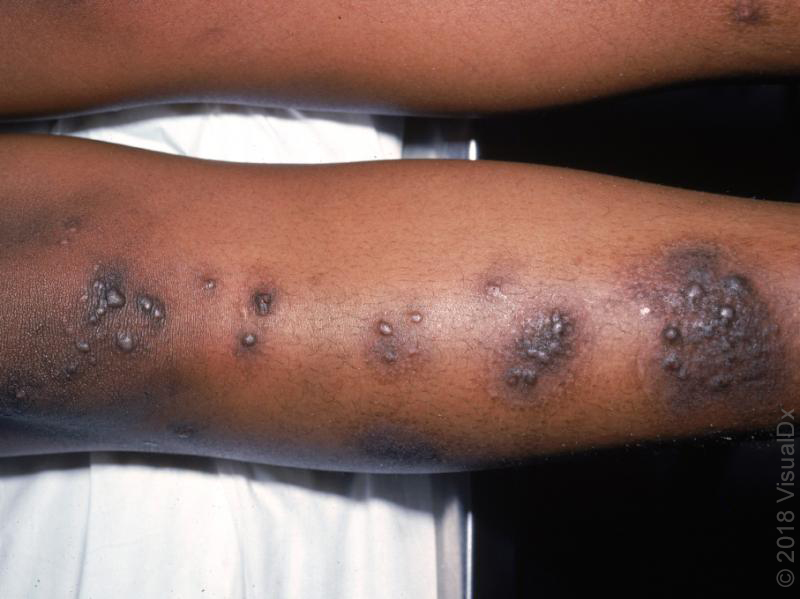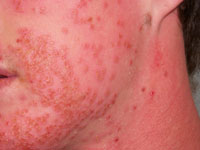Welcome to the section on talking to health professionals!
This section will look at:
- When should I see a health professional about my child's eczema?
- When do I need to see a skin specialist for my child's eczema?
- How can I get the most out of my child's appointments with the doctor or nurse?
- Common concerns about talking to your child's doctor or nurse
- How can a pharmacist help?
- Getting repeat prescriptions
When should I see a health professional about my child's eczema?
With all the information on this website, you will know a lot about how to get control and keep control of your child's eczema. But there may still be times when you need extra help.
You may need to see a doctor, nurse, or pharmacist if:
- You are worried about your child's eczema.
- Your child has a rash that doesn’t look like eczema.
- You have been trying a new treatment and it doesn’t seem to be helping after using it as directed for at least a week.
You may also need to see a doctor or nurse if:
- You are unsure how to use any of your child's treatments. It may also help to try our sections on ‘moisturising creams’ and ‘ flare control creams’ from the menu above. A pharmacist may also be able to advise you if you have questions about eczema treatments.
- Your child's eczema is crusty or weepy. If this happens, your child's eczema might be infected
What does infected skin look like?
Infected eczema will be more sore than usual. In lighter skin, infected eczema may look more red than usual. In darker skin, it may look more grey, purple, or brown than usual.
The skin may also start to weep and form yellow crusts. Sometimes you can see white or yellow blisters, or pus-spots under the skin.
You should see your child's doctor if:
- the redness or changes in your skin are spreading
- the infection is painful
- you have a fever or are unwell.
Here are some examples of what infected skin might look like:



You should see a doctor the same day if:
- Your child starts getting lots of blisters on their skin, like a cold sore spreading really quickly. If this happens, your child should see a doctor or go to the hospital the same day.
What are these blisters and what do they look like?
These blisters may be a sign of a potentially serious condition called Eczema herpeticum. This condition is caused by the cold sore virus. Children with eczema may get perfectly normal cold sores. But sometimes the cold sore virus can infect large areas of the skin.
Your child may have this condition if they:
- are very uncomfortable
- have a high temperature
- have lots of blisters that spread quickly across their skin.
There are other conditions that cause blistering that are not serious. But it can be difficult to tell the difference. So, see your child's GP or go to the hospital the same day if you are in any doubt.

When do I need to see a skin specialist for my child's eczema?
Most children with eczema are seen by their GP or another health professional at their GP practice. GP practices deal with a lot of eczema. Usually, your child will not need to see a specialist. But they may need to if their eczema is causing a lot of problems. Skin specialists will normally be a dermatologist, dermatology nurse, or GP with a special interest in dermatology.
You may want to go back to your child's GP if you feel your child's eczema is causing real problems for them. In many practices, you can ask to see a different doctor within your practice if you prefer.
Usually you will have to go through your GP practice to see a specialist. A Health Visitor can also do this in some areas. If you wish to see a private specialist, it is still usual to go through your GP for this.
We waited a long time to see the dermatologist and by then the eczema was actually fine. He told us the treatments the GP had given us were obviously working and to just carry on.
Your GP will usually send your child to a skin specialist if:
- They are not 100% sure that your child's skin condition is eczema.
- You are using moisturising and flare control creams, but your child's eczema is not getting better. Usually, this is if your child is having bad reactions to many different moisturisers.
The receptionist told me that one of the GPs in my practice has a special interest in skin problems so now I always try to see her when I want to talk about the eczema.
How can I get the most out of my child's appointments with the doctor or nurse?
There is a lot of information that people with eczema and their families need. You will usually only have 10 minutes with your doctor, which can feel too short.
This website can help you get the most important information about eczema. You can then use your appointments with your doctor or nurse to focus on the specific problems your child is having.
The eczema seemed like a little thing. So, I used to just ask about it when I was seeing the doctor about something else. But I think that’s why she seemed rushed and uninterested. Now I make an appointment just to discuss the eczema.
We have created a treatment record. It might help you talk to your doctor or nurse about your child's treatments. You can fill it in and take it with you next time you see their doctor or nurse. You can also ask the doctor or nurse to help you fill it in if there is anything you are unsure about.
You can download and print it out below:
Here are some tips that you may find useful:
- It can help if you go with a clear idea of what you are hoping to get from the appointment. Write down 2 or 3 most important questions before you go.
- Bring the treatments you use with you or a list or photo of them – the doctor may ask you about this.
- Many GP practices will let you can book a double appointment with your child's GP if you feel you have a lot to discuss. You can also go back to the GP if you need more advice or treatments.
- Don’t be afraid to ask if there is anything you don’t understand. For example, ‘Can you say that again? I still don’t understand’ or ‘Can I just check I understood what you said?’
- Don’t be afraid to ask about next steps. For example, ‘How long will this take to work?’ or ‘When should I come back?’
- Let the doctor know if you have any worries about your child's treatments – there are lots of different eczema treatments you can try. It’s important to find a treatment that works for your child.
- Make notes - Ask the doctor or nurse to write down the key points they said, take notes yourself, or ask a family member or friend to take notes for you. This makes it easier to remember what you need to do next.
- If your child's eczema is really bothering them or you, tell the doctor or nurse – it can be hard for them to understand how much your eczema is affecting your family in a short appointment.
Common concerns about talking to health professionals
Click on the boxes below to find out the answers to some common concerns about moisturising creams:
The treatments the doctor or nurse gives me don’t work!
It can take some time to find the right treatments for your child. This is because different creams suit different people. You might find that you have to try a couple of different creams before you find one that helps.
Some families find this process frustrating. It can be easy to feel like nothing your doctor or nurse gives you is working. But it's worth sticking with it - these creams are the best way of getting and keeping control of your child's eczema.
You may want to try the ‘2 week challenge’ available on the top right corner of the screen to find something that works for you.
My GP kept giving me different creams and I just felt he was fobbing me off. He said something about ‘trial and error’ and I thought, ‘I don’t want that, I just want something that works.’ But since the nurse explained to me about different creams suiting different people I can understand it a bit more.
My doctor wouldn’t give me the cream I wanted – why?
You can ask your child's doctor for different creams, but they may not always be able to give you the exact one you want. This is because doctors have a list of creams that they can give their patients.
If the cream you want is not on this list, then they are usually not able to give it to you. Chances are they’ll be able to give you a very similar one.
If you are not happy with this similar cream, you may be able to buy the cream at the pharmacist or online.
What about advice from pharmacists?
Pharmacists are trained experts in the use of medicines. This includes creams and ointments for eczema. They can:
- give advice about eczema, dry skin, or nappy rash
- sell some treatment creams without a prescription from a doctor or nurse
- give advice and information about sun creams, cosmetics, and wash products
- give advice about eczema and dry skin
You may need to pay for treatment creams you get without a prescription. You may prefer to get a prescription from your GP if you are using these creams a lot. Prescriptions are free for children.
How do I make sure I don’t run out of my child's treatments?
Using moisturising creams every day can help keep control of your child's eczema. So, it’s important to get more creams from your doctor or nurse in good time before you run out.
You can ask your doctor, nurse, or pharmacists for big 500g/ml tubs of moisturising creams. This would reduce the amount of times you have to order new treatment.
If your child has used flare control creams before, then it may be good to keep some of this in the house. This will let you deal with flare-ups early.
I tend to order a repeat prescription when I have half of the treatment left.
How to get repeat prescriptions?
You may find it helpful to set up repeat prescriptions. A repeat prescription lets you have a prescription for your child's treatments without seeing a doctor or nurse.
Ask the receptionist, GP, or pharmacist how repeat prescriptions work at your GP surgery if you are unsure.
My practice takes 48 hours to get a repeat prescription. So, I put the form in when the last tub is half empty. You get used to thinking ahead. Although I did get caught out on holiday not long ago and had to buy some from the pharmacy.

